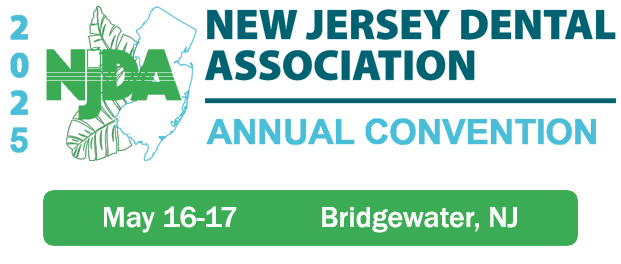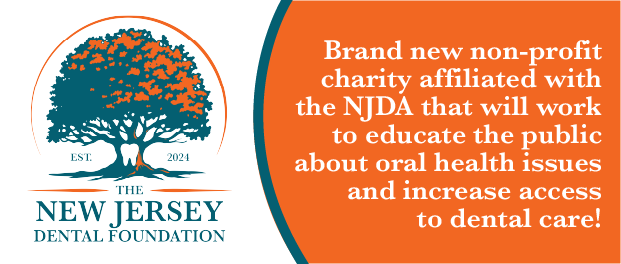Helping Dentists Navigate Their Finances
From tax planning and compliance to practice growth strategies, we understand the challenges and opportunities of healthcare finance. Let us help you on providing quality patient care while we manage the financial health of your practice. Discover how we can support your success throughout your business life cycle.
Perfect Smiles Start With You
Smile Design Boot Camp is an intensive 4-day course that equips dentists with the confidence and knowledge to incorporate techniques for single-arch and full mouth rehabilitation into their practice. Sign up to secure a spot!
Less Than A Month Away!
We are now less than a month away from the start of our two-day convention in Bridgewater… now is the time to pick your CE courses and make your plans to be part of this exciting gathering of the NJ dental community!
RSVP By May 1st
The NDJA Celebration on May 16 is going to be huge! We are taking over the entire 7th floor of the AC Hotel including three bars, outside patio, pool table, DJ and dance floor!
New Jersey Dental Foundation
Take a moment to learn more about NJDA's brand new initiative to help the public learn more and gain access to oral healthcare! Read the mission statement, governance, structure and more.
This is membership your way
Renew today to explore new lower membership costs and customization offerings.
Helping Members Succeed
The New Jersey Dental Association is the voice of the dental profession and a strong proponent of oral health in the state. Members are part of a vibrant community of dentists encompassing 12 local dental societies as well as the American Dental Association. Members engage in educational programs, have access to dentist-centric relationships and tools to navigate the business of dentistry and their careers, as well as benefit from dedicated advocacy that protects the interests of the profession. The organization is run by member-dentists with the support of a team of professionals at NJDA Headquarters. NJDA members never practice alone!
UPCOMING EVENTS
DENTAL NEWS AND NOTES
Postpartum Depression
Postpartum Blues vs Postpartum Depression
Guidelines for Practice Success | Managing Pregnancy | Health & Wellness
Pregnancy and a having new baby can cause you to experience a broad range of emotions. It’s not uncommon for women to feel overwhelmed, sad, or anxious at different times during their pregnancy and even after the baby is born. For many women, these feelings resolve on their own. But for others, these emotions are more serious and may present for some time.
These feelings are not caused by something you did or didn’t do. In fact, depression and anxiety that happen during the first year after the birth of your baby are considered medical conditions and can be treated if you seek help.
The information detailed here should not be considered medical advice; it’s an opportunity to let mothers experiencing these unfamiliar emotions know that they’re not alone and that help and support are available.
Postpartum Blues
Women with postpartum blues typically experience unusual feelings and exhibit uncharacteristic behaviors within two-to-three days after childbirth. Common signs of postpartum blues include:
- Feeling depressed and/or anxious.
- Being upset easily.
- Feeling angry with the new baby, other children, or your partner.
- Crying for no clear reason.
- Having trouble sleeping, eating, and making choices.
- Questioning whether you can handle caring for a baby.
Postpartum blues may come and go in the first few days after childbirth and usually improve within a few days or within one to two weeks without treatment.
Postpartum Depression
Women with postpartum depression experience intense feelings of sadness, anxiety, or despair that prevent them from being able to do daily tasks. Postpartum depression usually begins about one to three weeks after childbirth but can occur up to one year after delivery.
Left untreated, postpartum depression can last for months or even years. In addition to affecting the mother’s health, it can interfere with her ability to connect with and care for her baby and may cause the baby to develop problems with sleeping, eating, and behavior as he or she grows.
Common factors relating to postpartum depression include:
- Hormonal changes: Depression can be triggered as levels of estrogen and progesterone decrease sharply in the hours after childbirth.
- Having a history of depression: Women who have had depression at any time — before, during, or after pregnancy — or who currently are being treated for depression are at increased risk of developing postpartum depression.
- Emotional factors: Feelings of doubt about pregnancy are common and it can take a long time to adjust to the reality of having a new baby. Parents of babies who are sick or who need to stay in the hospital longer than expected may feel sad, angry, or guilty. These emotions can affect a woman’s self-esteem and how she deals with stress.
- Fatigue: Many women feel very tired after giving birth. It can take weeks for a woman to regain her normal strength and energy. Women who have had babies by cesarean birth may need even more time to regain their strength and energy.
- Lifestyle factors: Lack of support from others and stressful life events can greatly increase the risk of postpartum depression.
Common symptoms of postpartum depression include:
- Feeling sad, hopeless, or overwhelmed
- Crying more often than usual or for no apparent reason
- Worrying or feeling overly anxious
- Feeling moody, irritable, or restless
- Oversleeping, or being unable to sleep even when baby is asleep
- Having trouble concentrating, remembering details, and making decisions
- Experiencing anger or rage
- Losing interest in activities that are usually enjoyable
- Suffering from physical aches and pains, including frequent headaches, stomach problems, and muscle pain
- Eating too little or too much
- Withdrawing from or avoiding friends and family
- Having trouble bonding or forming an emotional attachment with your baby
- Persistently doubting your ability to care for your baby
- Thinking about harming yourself or your baby
Any new mother who experiences these symptoms should see a health care provider right away to find out whether she has postpartum depression and, if so, receive appropriate treatment. Keep in mind that, because symptoms relating to postpartum depression are broad and can be different for every woman, only a qualified healthcare professional can diagnose whether a woman is experiencing postpartum depression or something else.
For women diagnosed with postpartum depression, know that help and support are available. Possible treatment options may include:
- Counseling/Talk Therapy: This treatment involves talking one-on-one with a mental health professional (a counselor, therapist, psychologist, psychiatrist, or social worker). Two types of counseling often used to treat postpartum depression are:
- Cognitive Behavioral Therapy (CBT), which helps people recognize and change their negative thoughts and behaviors
- Interpersonal therapy (IPT), which helps people understand and work through problematic personal relationships.
- Medication: Antidepressant medications act on the brain chemicals that are involved in mood regulation. Many antidepressants take a few weeks to be most effective. While these medications are generally considered safe to use during breastfeeding, a woman should talk to her health care provider about the risks and benefits to both herself and her baby.
Among the many helpful resources available through the National Institutes of Health’s National Child and Maternal Health Education Program are: the Action Plan for Depression and Anxiety Around Pregnancy, A Fact Sheet from the Office on Women’s Health: Postpartum Depression, and the National Institute of Mental Health’s Postpartum Depression Facts. The American College of Obstetricians and Gynecologists (ACOG) also offers resources, including an FAQ on Postpartum Depression.
Contact Us
Phone: 732-821-9400 or dial the Staff Directly
Fax: 732-821-1082 | Email: info@njda.org | Follow us @NJDentalAssoc
One Dental Plaza, North Brunswick, NJ 08902













